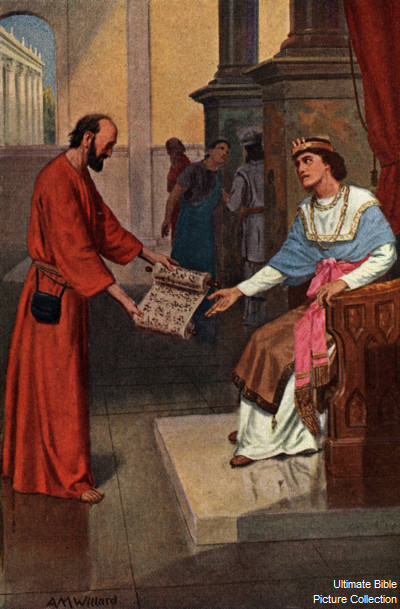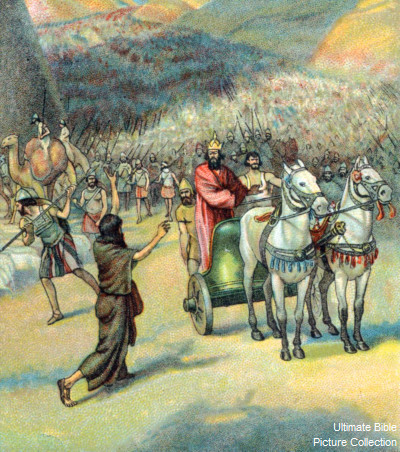 The reforming king, Hezekiah, was followed by his son, Manasseh, who reigned from 697-642 BC. Chapter 33, verses 1-9, describe Manasseh as one of the worst kings of Judah, if not the worst. His list of sins includes building altars for a host of pagan gods, engaging in sorcery and necromancy, placing idols inside the temple, and sacrificing his own sons as part of divination rituals.
The reforming king, Hezekiah, was followed by his son, Manasseh, who reigned from 697-642 BC. Chapter 33, verses 1-9, describe Manasseh as one of the worst kings of Judah, if not the worst. His list of sins includes building altars for a host of pagan gods, engaging in sorcery and necromancy, placing idols inside the temple, and sacrificing his own sons as part of divination rituals.
Verse 9 summarizes Manasseh’s reign: “Manasseh led Judah and the inhabitants of Jerusalem astray, to do more evil than the nations whom the LORD destroyed before the people of Israel.” The Judahites had even outdone the Canaanites whom God drove out of the Promised Land centuries before.
J. A. Thompson, in vol. 9, 1, 2 Chronicles, The New American Commentary, comments on Manasseh’s depravity:
This whole passage is strongly reminiscent of Deut 18:9–13. All in all, the sins of Manasseh detail the depths to which counterfeit religion will take a person. Here was the Davidic king, the heir and keeper of the promises of the covenant with David, worshiping poles and stones and the stars. Worse yet, he was murdering his own sons, one of whom otherwise might have been heir to the throne and the covenant. Paganism, whether in its ancient or modern manifestations, is not only an offense to God but is a degradation to humankind.
To punish Judah, God brings the Assyrians down from the north. Manasseh is captured and led away to captivity with a hook through his nose. While in captivity, Manasseh finally repents of his disastrous leadership and God allows him to return to his kingdom before he dies.
In verses 21-25, we see that Manasseh’s son, Amon, rules over Judah for only two years (642-640 BC). Like his father, he continues to promote worship of foreign gods. He is assassinated by his servants, likely for political reasons. Many scholars believe he was pro-Assyrian and murdered by those who desired to rebel against Assyrian authority.
Chapter 34 opens with the announcement of the reign of King Josiah. He would rule from 640-609 BC (thirty-one years). The Chronicler gives unparalleled praise to Josiah, saying the following: “And he did what was right in the eyes of the LORD, and walked in the ways of David his father; and he did not turn aside to the right hand or to the left.” No other king of Judah is given this compliment.
Verses 3-7 record Josiah’s attempts to undo everything that Manasseh had done. Altars are torn down. Idols are destroyed. Josiah even takes his reforms to the lands formerly occupied by Israel, the northern kingdom. His ability to do so is possible because of the weakening of Assyrian power during this period. The Assyrians had bigger problems than trying to retain control of this Jewish province.
Why did Josiah seek after God while his father and grandfather did the opposite? We can’t know for sure, but Thompson offers the following explanation:
The initiative for reform may not have been entirely due to Josiah, for in his boyhood he would have been under the influence and constraint of a regent or regents who might well have been from among the ‘people of the land,’ who no doubt saw the dangers of the religious policies followed by Manasseh and Amon and were anxious to return to a Yahweh-centered religious practice. One persuasive proposal is that the prophets Zephaniah and Jeremiah had an influence on Josiah before the finding of the book of the law in 621 B.C.
Beginning in verse 8, we read that Josiah begins to renovate and repair the temple, which had no doubt been seriously neglected under Manasseh. As the high priest, Hilkiah, is gathering the money donated by people all over Israel and Judah, he discovers the “Book of the Law” inside the temple.
Scholars are divided over what the Book of the Law contains. The most popular view is that it refers to the Book of Deuteronomy, which is primarily the summary and re-statement of the previous four books of the Torah. Other scholars believe that the Book of the Law actually included the entire Torah – all five books. It is truly shocking that the Levites, working in the temple, and the king himself, had lost all copies of the Torah, but that seems to be the case. Some scholars speculate that the Book of the Law was hidden during Hezekiah’s reign due to threat of invasion, or possibly during Manasseh’s reign because of his apostasy.
Hilkiah gives the book to a man named Shaphan, the king’s secretary. Shaphan takes the book to Josiah and starts reading from it. Upon hearing the words from the book, Josiah tears his clothes in mourning and sends his high priest to consult with a prophetess named Huldah.
Huldah prophesies that the people of Judah will be punished by God for their worship of other gods, just as the Book of Deuteronomy warns. Huldah, however, prophesies that Josiah will not live to see the day when Judah is destroyed. Because of Josiah’s humility before God, the kingdom will survive while he is alive.
Upon hearing these words, Josiah gathers the people of Judah to the temple in Jerusalem. He reads aloud from the Book of the Law and he rededicates the nation to the covenant between God and Israel. “And the king stood in his place and made a covenant before the LORD, to walk after the LORD and to keep his commandments and his testimonies and his statutes, with all his heart and all his soul, to perform the words of the covenant that were written in this book.”
In chapter 35, verses 16-19, Josiah celebrates the Passover for the first time in decades. The Chronicler claims that Josiah’s Passover celebration was unlike all previous. “No Passover like it had been kept in Israel since the days of Samuel the prophet. None of the kings of Israel had kept such a Passover as was kept by Josiah, and the priests and the Levites, and all Judah and Israel who were present, and the inhabitants of Jerusalem.”
The nation of Judah would walk in the ways of God for the remainder of Josiah’s reign. Sadly, Josiah is killed during military action with Egypt in the year 609 BC. With his death, God’s patience with Judah would come to an end. The Assyrians had been defeated by a new superpower, the Babylonians. God would now turn Babylonian eyes toward Jerusalem and Judah.
 Following Rehoboam’s death, his son Abijah occupies the throne of Judah until 911 BC. Abijah did not seek after God, but his son Asa would. Asa became king in 911 BC and remained in command until 870 BC. Chapters 14 and 15 of 2 Chronicles describe Asa’s reign.
Following Rehoboam’s death, his son Abijah occupies the throne of Judah until 911 BC. Abijah did not seek after God, but his son Asa would. Asa became king in 911 BC and remained in command until 870 BC. Chapters 14 and 15 of 2 Chronicles describe Asa’s reign.